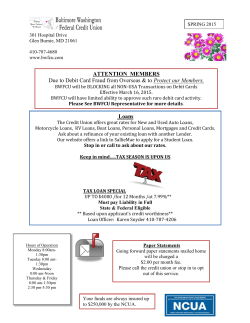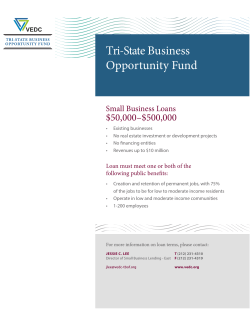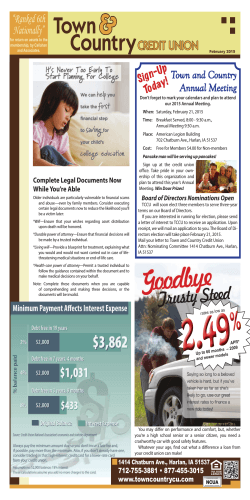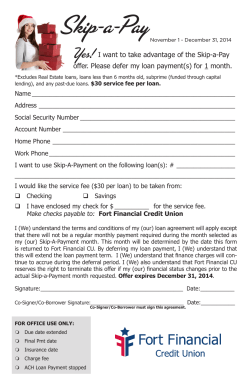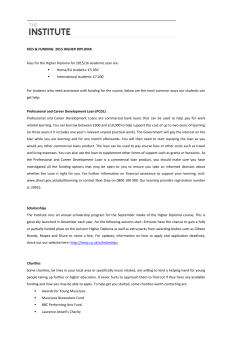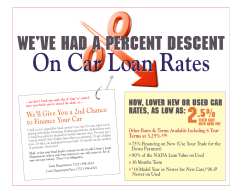
What should you do if you default on your loan
Thank you for checking out the Ultimate Student Loan Guide! Dhanya and I spent months collecting the questions and researching answers in this guide. ! ! We hope that you love it and that it answers several of the student loan questions you may have. ! ! If you think this guide will be helpful to your friends, family, and audience please share it. If you share it on social media please use the hashtag #UltStudentLoanGuide so you can interact with others who have downloaded the guide... ! ! ! Actually, let’s be honest.! We are just nosey and want to see all of awesome stuff you are saying. ! Hey man, we spent months on this. Can you blame us?! ! ! !! !! ! ! All content provided in the Ultimate Student Loan Guide is for informational purposes only. The owner of this blog makes no representations as to the accuracy or completeness of any information in this document or found by following any link mentioned in this document. ! The owner of MyFabFinance.com will not be liable for any errors or omissions in this information nor for the availability of this information. The owner will not be liable for any losses, injuries, or damages from the display or use of this information. Student Loan Basics ! What is the difference between private and public loans? ! “Public” loans, which are commonly referred to as federal loans, are funded by the federal government. government offers both subsidized and unsubsidized loans. The federal ! In order to receive a federal student loan you must meet the following criteria : ! ● Complete a FAFSA; ● be a U.S. citizen or an eligible noncitizen; ● have a valid Social Security number ● be registered with Selective Service, if you’re a male (you must register between the ages of 18 and 25); ● be enrolled or accepted for enrollment as a regular student in an eligible degree or certificate program; ● be enrolled at least half-time to be eligible for Direct Loan Program funds; ● maintain satisfactory academic progress in college or career school; ! ! ● sign a master promissory note and complete entrance counseling “Private” student loans are nonfederal loans, made by a lender such as a bank, credit union, state agency or a school. Private loans are based on credit worthiness. Most federal loans are available for undergraduate and graduate students enrolled in at least 6 credits regardless of credit-worthiness. PLUS loans (Graduate Plus loan and Parent Plus loans) are the only federal loans whose eligibility is based on credit worthiness. ! ! www.MyFabFinance.com! ! ! ! ! ! ! 2 !! ! ! ! ! ! #UltStudentLoanGuide What’s the difference between a subsidized and unsubsidized loan?! Here are the fundamental differences between subsidized and unsubsidized loans borrowed from the US Department of Education: Type to enter text ! Direct Subsidized Loans Direct Unsubsidized Loans ONLY available to undergraduate students. Available to both undergraduate and graduate students. You do not have to demonstrate financial need. The Department of Education pays the interest that YOU are responsible for paying the interest that accrues accrues on this loan a) while you’re still enrolled at least on this loan…during ALL periods (forbearance, half-time b) for the first six months after you leave school deferment, while you are enrolled). Interest accumulates and c) during a period of deferment (a period where you and capitalizes (interest is added to the principal loan postpone payments on loans due to hardship). amount) when you choose not to pay the interest while you are enrolled, during grace periods, deferments or forbearances. Six years is the maximum amount of time you can receive a subsidized loan if you are enrolled in a four-year bachelors program. Three years if you are enrolled in an associate degree program. There is no current time limitation on direct unsubsidized loans. There are aggregate loan limits. A Perkins loan is a type of subsidized loan but not offered at every academic institution. PLUS loans (graduate plus or parent plus) fall in this category. ! *For loans disbursed between July 1, 2012 and July 1, 2014, you are responsible for the payment of the interest that accrues during a grace period. If you decide not to make interest payments during your grace period, then the interest is added to your principal balance* www.MyFabFinance.com! ! ! ! ! ! ! 3 !! ! ! ! ! ! #UltStudentLoanGuide How do you find out who your servicer is?! If you have a federal servicer you can visit studentaid.ed.gov or nslds.ed.gov. ! You will have one of the following servicer’s if you have borrowed loans from the federal government to fund your education: ! Aspire Resources Cornerstone ESA/Edfinancial FedLoan Servicing Granite State-GSMR Great Lakes Educational Loan Services MOHELA Navient Nelnet OSLA Servicing VSAC Federal Loans ! Your servicer information should also appear on your credit report. ! ! ! ! ! ! www.MyFabFinance.com! ! ! ! ! ! ! 4 !! ! ! ! ! ! #UltStudentLoanGuide Student Loan Repayment! Should you consolidate? ! The short answer is yes IF you would like to make a single monthly payment to pay off your loan. There are advantages and disadvantages of loan consolidation and it is hard to give a definitive answer because each individual has varying circumstances. ! Students that have federal loans can consolidate their loans through the following servicers: •Great Lakes Educational Loan Services •Nelnet •FedLoan Servicing (PHEAA) •Navient (formerly Sallie Mae) ! Federal loans cannot be consolidated with private loans. Some private loans are eligible for consolidation through various servicers such as Chase, NextStudent, Student Loan NetWork or Wells Fargo. Each servicer has differing terms and has a cap on the amount of debt you can consolidate. Avoid any lender that charges prepayment fees! ! Before consolidating, take your budget and extenuating circumstances into account. ! DO YOUR RESEARCH, SCRUTINIZE THE TERMS AND CONDITIONS, AND ASK QUESTIONS! ! ! ! ! ! ! ! ! ! www.MyFabFinance.com! ! ! ! ! ! ! 5 !! ! ! ! ! ! #UltStudentLoanGuide What are the pros and cons of consolidation?! ! Pros Cons Streamlines your student loan repayment. Once your loans are combined into a Direct Consolidation Loan they cannot be removed Might gain access to alternative payment plans not previously available to you Can lower monthly payments by spreading payments out over a 30 year period. Lose any borrower benefits from the original loan (i.e. interest rate discounts, principal rebates or some loan cancellation benefits). Extending the repayment term, may increase the total interest paid over the lifetime of the loan. You can switch loans with variable interest rates to a fixed interest rate. Consolidation loan rates are fixed and cannot be changed…even if interest rates are decreasing. ! What loans can you consolidate?! ! Direct subsidized loans, Direct unsubsidized loans, Stafford loans, Direct PLUS loans, PLUS loans from the FFEL Program (Federal Family Education Loan Program), supplemental loans for students (SLS), Perkins loans, Nursing loans, Health Education Assistance loans and some existing consolidation loans are eligible for consolidation. ! Parent PLUS loans cannot be transferred to the student through consolidation. ! For more information on how to consolidate your federal student loans you can contact the Loan Consolidation Information Call Center at 1-800-557-7392 or you can visit studentaid.gov and studentloans.gov. ! ! www.MyFabFinance.com! ! ! ! ! ! ! 6 !! ! ! ! ! ! #UltStudentLoanGuide How do you manage payments with an entry level job or a low income?! You should consider the Income Based Repayment Plan (IBR) or Pay As You Go plan. Both of these plans are best for individuals who have high loan debt and low income. The Pay As You Earn repayment plan has a lower monthly payment cap than the IBR plan (10% vs 15%) and a lower repayment term (up to 20 years vs. up to 25 years). They both extend the amount of time you have to repay your loans however you will end up paying more in interest. You must submit income documentation annually to recalculate your monthly payment amount. ! Please note that if you are married or get married your spouse's income can be counted towards yours under the IBR if you file jointly. ! Borrowers experiencing short term financial hardships such as job loss, sudden deaths, or a growing family may be better off seeking a forbearance or deferment. ! What does it mean when you default on your student loan?! If you pay your loans monthly, your loan is considered to be in default if you have not made any payments on your student loan for 270 days (nine months) and have not made any arrangements with your servicer. ! What should you do if you default on your loan payments?! You want to avoid this by any means necessary. Defaulting on your student loans adversely affects your credit score. If you have defaulted contact your loan servicer immediately. Request your loan be removed from default status. You will be provided with one of three options for getting your loan out of default: ! ! www.MyFabFinance.com! ! ! ! ! ! ! 7 ! ! ! ! ! ! ! #UltStudentLoanGuide What should you do if you default on your loan payments (contd.)?! Loan Repayment- Pay your loan in full. Chances are if your loan is in default, you won’t be able to take advantage of this opportunity unless you’ve come into a windfall of money. Since this isn’t a viable option for most of us you should try to negotiate a monthly repayment plan. ! Loan Rehabilitation! If you have a: ! Direct Loan you must make at least 9 full payments in the agreed upon amount within 20 days of their monthly due date to the US Department of Education for a consecutive 9 month period. Once you have made the 9 payments, your loan(-s) will be returned to loan servicing. Wage and tax garnishments will not be counted toward your 9 qualifying payments. ! Federal Family Education Loan the same applies to you as with Direct Loan guidelines. The difference is that once you have made 9 payments, your loans may be purchased by an eligible institution. ! Perkins Loan you must make at least 9 on-time monthly payments. Once you have made the required payments, your loan(s) will continue to be serviced by the Department until the balance owed is paid in full. ! Under Rehabilitation, once your loans have been rehabilitated your monthly payments will probably increase and collection costs may be added to your principal balance. ! IMPORTANT: Delinquent payments reported before your loan defaulted will be removed from your credit report. ! ! ! www.MyFabFinance.com! ! ! ! ! ! ! 8 !! ! ! ! ! ! #UltStudentLoanGuide What do you do if you can't afford to pay back your loans at this time?! You should contact your loan servicer and request a deferment, forbearance or re-evaluation of your monthly payment. ! What are the forgiveness options available?! There are two instances when your loans are eligible for forgiveness: teacher loan forgiveness and public service loan forgiveness. ! Teachers Loan Forgiveness Applies to teachers that have been teaching full-time for five consecutive years in low income elementary or secondary schools or educational service agency are eligible to have as much as $17,500 of subsidized or unsubsidized loans forgiven. PLUS loans cannot be included (no outstanding balance on Direct Loan or FFEL Program loan on Oct. 1, 1998). ! Public Service Loan Forgiveness If you are employed with an agency that has been designated as a 501c3 and have repaid 120 payments on your Direct Loans (after Oct. 1, 2007), the remaining balance may be forgiven. You cannot be in default. ! Are there any student loan forgiveness options outside of public service? Yes, with IBR and Pay as you Go repayment plans. But it takes 10-15 years longer. Under current regulations if you have not repaid your loans in full after you make the equivalent of 20/25 years of qualifying monthly payments, any outstanding balance on your loan will be forgiven. What are the tax benefits or implications of student loans? The interest of you have paid on your student loan payments is deductible up to $2,500, but is subject to income limitations. If you make more than $80,000 as an individual or $160,000 as a couple, you can’t claim the deduction. Even if your lender doesn’t provide the 1098-E, you can still deduct the interest. Keep your records in order so that you can prove all of the interest you paid. The student loan interest is a deduction to income, which can reduce your income subject to tax by up to $2,500.00. A benefit of this deduction is it can be taken even if you do not itemize deductions. ! www.MyFabFinance.com! ! ! ! ! ! ! 10 !! ! ! ! ! ! #UltStudentLoanGuide How much of your payment goes to interest vs. principal? Is this controllable?! ! The government regulates how loan servicers apply your payments. ! When your payments are received the following occurs: ! 1. Any fees associated with the loan are paid (late fees), 2. Funds are applied to the interest that has accrued to date 3. Remaining funds go toward the principal of the loan. ! ! You can’t control how payments are applied. How Student Loan Interest Works Say you have a $1,000 loan at 5 percent interest placed on a standard 10-year term, with payments made approximately every 30 days. Day one, you have $1,000 in principal and $0.14 interest. Day two, $1,000 interest and $0.28 interest and so on until day 30, when you have $1,000 principal and $4.20 in interest. On day 30, the loan holder receives your $50 payment. You don’t owe any late fees, so first they pay off the interest that has accrued and the remaining $45.80 goes toward the principal. So, now your principal is $954.20 with $0 in interest. That means the principal balance is lower, so you’ll only accrue about $0.13 in interest per day going forward. *cite source* ! ! ! ! www.MyFabFinance.com! ! ! ! ! ! ! 11 ! ! ! ! ! ! ! #UltStudentLoanGuide How does paying twice a month help reduce amount of interest owed?! Interest accrues by time, therefore you cannot prepay interest on time that has not accrued yet. Since student loan interest is accrued daily, the lower your balance, the less interest you have to pay. By paying two payments you will reduce the principal that interest accrues on ultimately reducing your interest paid over time. ! However you must notify the lender that your payment should be applied to the principal balance. Otherwise you run the risk of the lender treating your second payment as an early installment for the following month. ! Should you pay off your undergraduate student loan interest while in school?! Yes, if you have unsubsidized undergraduate loans and are able to make interest payments while still enrolled it is strongly suggested. Electing not to pay interest while enrolled increases the amount of interest you pay over time. ! Should you pay private loans first? For the sake of clarity we will assume that this applies to an individual who has private and federal loans. This answer is that depends. It’s a personal decision and the borrower should consider their interest rates. Typically we suggest that you aggressively pay down the loan with the highest interest rate. If you do decide to focus on the private loan make sure your federal loan is not neglected and that you are making regular payments of have made deferment arrangements. ! Should you use Life Insurance to pay student loans? This is a personal choice and is situational. If you receive a death benefit from the passing of someone close to you, by all means consider it. But you should also compare the interest rate of your student loans with interest rates on other debts you have. If your student loans are your least expensive debt interest wise, you might want to save them until last. If you are considering borrowing against your life insurance policy to pay off your loan that is again a personal choice. As mentioned in the scenario above it might not be the smartest use of your monies. Also keep in mind that depending on the conditions of your policy, fees and penalties may apply. ! www.MyFabFinance.com! ! ! ! ! ! ! 12 !! ! ! ! ! ! #UltStudentLoanGuide Student Loans & Your Credit! How do student loans impact your credit? Student loans are a way to establish credit history for people who don’t have access to or prefer not to utilize credit cards. Student loans can serve as your opportunity to demonstrate your ability to reliably repay debt. Here’s why, student loans are considered installment credit. Installment credit is credit that has a specific, finite number of payments and usually comes in the form of loan that is paid back in even increments based on a number of months. Auto loans, personal loans, and mortgages are also examples of installment credit. Revolving credit is credit that doesn’t have a specific number of payments and is used on a regular, as-needed basis. Credit cards are the most well-known type of revolving credit. You spend, you pay off, you have the ability to spend again with a varying monthly payment and payments can go on for as long as the line of credit is open. Because student loans are considered installment loans, they can add to your credit mix, which accounts for 10% of your credit score. While 10% may sound negligible, it makes a difference. So if you are live in a city with ridiculously high housing costs such as NYC, Miami, Washington DC, or Los Angeles and can’t afford a mortgage, student loans provide an opportunity to mix your lines credit. Potential creditors consider student loans to be good credit. This does not disregard your payment history. This means that creditors look at it as a an investment in your future. Having $35,000 in student loan debt vs. $35,000 in credit card debt is viewed differently by potential creditors and will be treated differently during the review process when lenders decide whether to grant a mortgage, auto loan, or small business loan. www.MyFabFinance.com! ! ! ! ! ! ! 13 ! ! ! ! ! ! ! #UltStudentLoanGuide Should you pay off your loan completely in one lump sum?! Monthly payments on student loan debt build credit. Take that into consideration before making a lump sum payment. What happens if you forget to make your student loan payment?! You generally have about 30 days before federal loan lenders report your account past due to the credit bureaus at the end of the month. I do not recommend factoring this into your repayment strategy because a lender’s repayment policy is up to them, but if you find yourself a few days late, you are generally okay. Make payment when the funds become available. Do student loans affect your Debt-to-Income ratio?! Yes. Student loans are considered debts that need to be repaid. ! ! ! ! ! ! ! !! !! ! ! www.MyFabFinance.com! ! ! ! ! ! ! 14 ! ! ! ! ! ! #UltStudentLoanGuide ! THANK YOU! Thank you for checking out the Ultimate Student Loan Guide. Dhanya and I spent months collecting questions and researching answers. We hope that you found it helpful. ! If you think this guide will be helpful to your friends, family, and audience please share it !! If you share it on social media remember to use #UltStudentLoanGuide.! If you still have questions you can e-mail them to [email protected] or tweet us using the #UltStudentLoanGuide hashtag. ! ! Get Social: Twitter @MyFabFinance | Instagram @MyFabFinance | Youtube - My Fab Finance |Facebook.com/myfabfinance
© Copyright 2026
